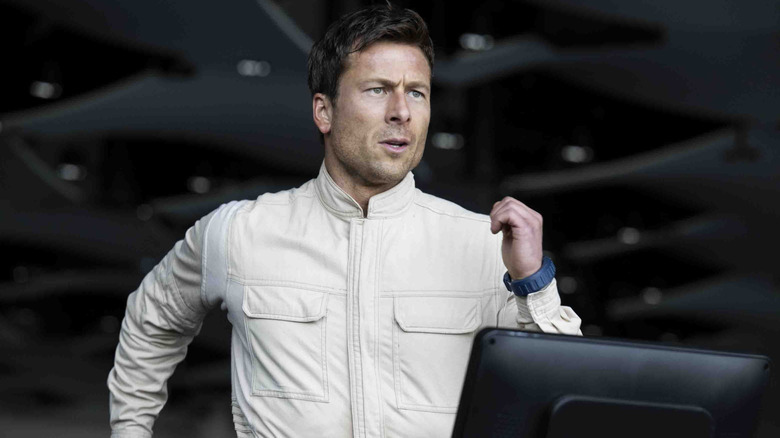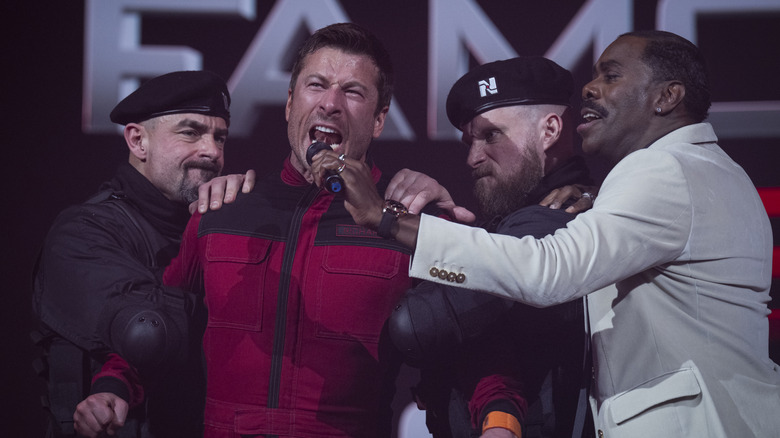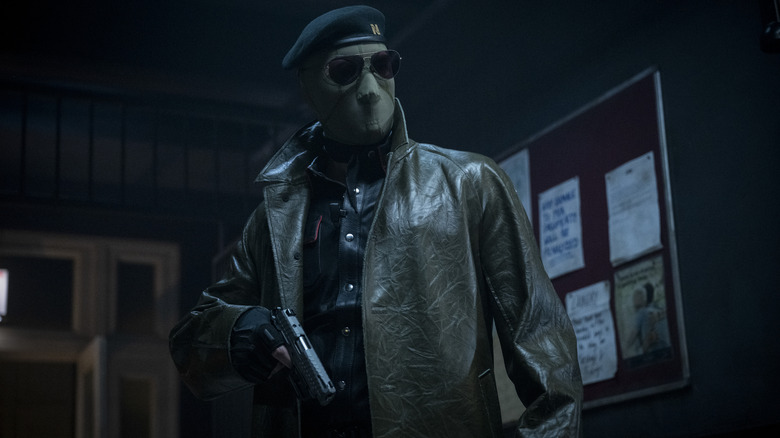The Running Man Review: Glen Powell's Thrilling Action Film Doesn't Quite Meet The Moment
- Surprisingly mature work from Edgar Wright
- Strong showing from Glen Powell in the lead
- Largely true to the source material
- Doesn’t quite stick the landing
- Too toothless where it really counts
Over the years, Stephen King has had to endure some awful movie adaptations, but 2025 has given us three well received ones thus far. Reigning king of King translations Mike Flanagan gave us the uplifting "The Life of Chuck"; Osgood Perkins dropped the gleefully malicious "The Monkey"; and Francis Lawrence offered up the grueling, relevant "The Long Walk." But Edgar Wright gets to close the year out with "The Running Man," perhaps the most timely of the bunch.
The original 1982 novel, released under King's pen name Richard Bachman, was set, appropriately enough, in the year we're currently living in. The source material's prescience places it in that special genre of dystopian fiction that has grown ironic and darkly comic due to the passing of time and our present day being so much stranger and more haunting than ever imagined. In a post-"Squid Games" world, this book has been begging for another crack at the big screen. After the relative failure of "Last Night in Soho," both critically and commercially, some may wonder if Wright is the man for the job.
On paper, teaming with rising star Glen Powell for the biggest production of Wright's career seems like a recipe for a big bounce back. In many ways, "The Running Man" feels like the win he and the audience both needed, but the shortcuts it takes to please the crowd hold it back from genuine greatness.
Truer to the book
In 1987, Arnold Schwarzeneger starred in an adaptation of "The Running Man" that took the title and general premise from Stephen King's novel and little else, using that text as a springboard for a colorful and craven action vehicle. But Edgar Wright's "Running Man" is a much more faithful production. Set in a near future where America's income inequality has evolved into a full on necrocapitalist dystopia, the film focuses on Ben Richards (Glen Powell), a blacklisted blue collar worker whose only recourse to provide for his wife (Jayme Lawson) and sick daughter is to join a life or death game show. Initially, he auditions to join one of the safer game shows in the hopes of getting enough money for his daughter's meds, but producer Dan Killian (a pitch-perfect Josh Brolin) sees Richards' rage, his ingenuity, and his charisma as the solution to his biggest problem.
The Network (a media conglomerate indistinguishable from the state itself) has a variety of reality content where the lower rungs of society risk their bodies for cash, but "The Running Man" is their crown jewel. Giving contestants a head start of 12 hours, they must try to survive 30 days while being stalked by hunters, with viewers and citizens incentivized to report and dox them. Killian sees Richards as the kind of guy who could go all the way, or rather, that viewers will believe could go all the way, as they haven't had a real contender since the first season.
Powell, no stranger to reality show races, is really good in the leading role. He's assured and has great presence, the perfect guy to anchor a picture like this. He's also great grounding against the more colorful supporting players, like a scenery chewing Colman Domingo as the show's host Bobby T, or a delightfully pulpy turn from Lee Pace as McCone, the masked leader of the hunters who feels like a cross between a GI Joe character and the logical intellectual extrapolation of the respective shows "Cops" and "Dog: The Bounty Hunter." (Special dispensation for Michael Cera in a key role that threatens to steal the show, but is hampered by some conveniently silly decision making by his character.)
Wright re-teams with his "Scott Pilgrim vs. the World" co-writer Michael Bacall on this screenplay and the two have a real blast dramatizing the rules of the game, making the entire operation appear lively and entertaining without getting so lost in that excitement they lose sight of the abject horror of the situation. The director's trademark kineticism proves useful in a pop art sense, but his frenetic pacing is tempered by a welcome amount of restraint. Wright is one of the last of the Ain't It Cool Cowboys, fanboy fave auteurs whose occasionally infantile attraction to nerd culture feel limiting in their artistic evolutions.
To that end, "The Running Man" largely strikes a balance that feels like a step forward for the filmmaker. He has made a "cool" action movie that doesn't put its pursuit of coolness before the ideas of the text. But as with his last picture, he struggles in the final act when it comes to threading the needle of the film's themes.
... except where it counts
"The Running Man" is a dark book, so pledging to make a more truthful adaptation means wrestling with its haunting and difficult ending. One could skip the whole book, read the final page, and instantly understand why, in a post-9/11 world, bringing it to life one-to-one on the big screen would be an impossibility for any major studio. For the first two thirds of the film, Edgar Wright hews closely to the novel's narrative and relatively pessimistic worldview, but there are enough departures from that tone to know the finale will be some kind of pulled punch. But will it be the happy, studio interference route where the picture veers into an uplifting happy ending, or find a different way to conclude things more honestly? Wright somehow chooses a secret, worse, third thing.
It's clear that the more comedic, surface level critique of this fictional world comes easier to Wright. Depicting the other game shows and parodying the Kardashians with a show called "The Americanos" are easy lifts. He even avails himself nicely in dramatizing the moral complicity of the bourgeoisie, in accurately capturing how social media and pocket devices capable of capturing 4K video have turned average people into citizen-cops and individual extensions of the surveillance state. Contrasting the easy ways people perpetuate systems of control against the ways they stand apart and help one another creates a meaningful framework for how a summer blockbuster type film can still provide a shining light to induce solidarity in the viewer.
But the busy, convoluted way Wright and Michael Bacall overcomplicate the film's final scenes doesn't meet the moment. From an experiential level, it ends the film in a largely satisfying way, allowing the audience to breathe a sigh of relief while still being able to strike a revolutionary pose. "The Running Man" is such an enjoyable race while you're running it, but once you make it past the finish line and start reflecting on the experience, it leaves too much to be desired.
"The Running Man" races into theaters on November 14.


